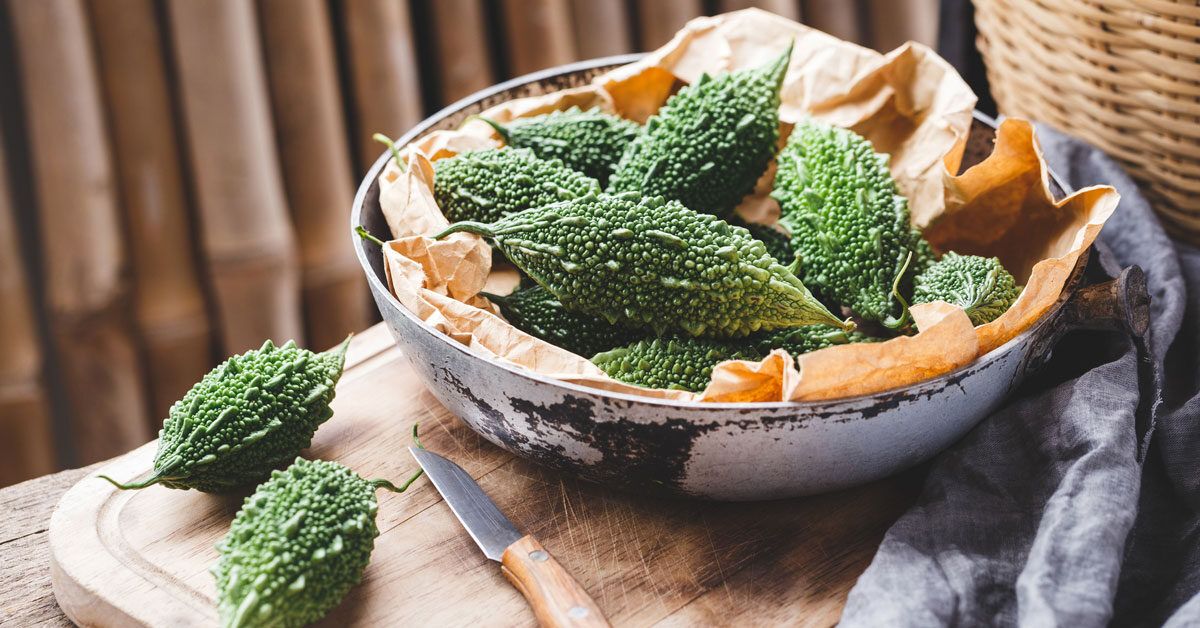6 Benefits of Bitter Melon (Bitter Gourd) and Its Extract
What is Bitter Melon?
Bitter melon, also known as bitter gourd or Momordica charantia, is a tropical vine that belongs to the gourd family and is closely related to zucchini, squash, pumpkin, and cucumber. It’s cultivated around the world for its edible fruit, which is considered a staple in many types of Asian cuisine.
Benefits of Bitter Melon
- Rich in Nutrients
Bitter melon is a good source of several key nutrients, including vitamins A and C, folate, potassium, zinc, and iron. One cup of raw bitter melon provides 21 calories, 4 grams of carbs, 2 grams of fiber, and a significant amount of essential vitamins and minerals.
How Does Bitter Melon Benefit Your Health?
- Improves Blood Sugar Control
Research suggests that bitter melon has been used by indigenous populations to help treat diabetes-related conditions. Studies have shown that it can decrease blood sugar levels and improve insulin sensitivity, making it a potential natural remedy for type 2 diabetes.
- Antioxidant Properties
Bitter melon is rich in antioxidant compounds like catechin, gallic acid, epicatechin, and chlorogenic acid, which can help protect cells against damage and reduce the risk of chronic diseases like cancer and heart disease.
- Supports Heart Health
Animal studies have shown that bitter melon extract may help lower cholesterol levels and improve cardiovascular health by reducing triglycerides and LDL cholesterol.
- May Help with Weight Loss
Bitter melon is low in calories and high in fiber, making it a potential addition to a weight loss diet. It also has laxative properties, which may help support digestion and reduce hunger.
- Cancer-Fighting Properties
Several test-tube studies have shown that bitter melon extract may have anti-cancer properties, inhibiting the growth and spread of cancer cells.
Precautions and Side Effects
While bitter melon is considered safe to eat in moderation, consuming high amounts or taking supplements may be associated with adverse effects like diarrhea and abdominal pain. Pregnant women, people with underlying health conditions, and those taking blood sugar-lowering medications should consult their healthcare provider before using bitter melon.
How to Incorporate Bitter Melon into Your Diet
Bitter melon can be prepared in a variety of ways, including juicing, stir-frying, sautéing, baking, and stuffing. Here are a few interesting ways to add bitter melon to your diet:
- Juice bitter melon along with other fruits and vegetables for a nutrient-packed beverage.
- Mix bitter melon into your next stir-fry to bump up the health benefits.
- Sauté bitter melon alongside tomatoes, garlic, and onions and add to scrambled eggs.
- Combine seedless bitter melon with your choice of dressing and garnish for a savory salad.
- Stuff with ground meat and vegetables and serve with a black bean sauce.
Conclusion
Bitter melon is a nutrient-rich fruit with a unique flavor and numerous health benefits. From improving blood sugar control to supporting heart health, bitter melon is a great addition to a healthy, well-rounded diet. However, it’s essential to consume it in moderation and be aware of potential side effects and interactions with medications.
FAQs
Q: What are the potential side effects of bitter melon?
A: Bitter melon may cause diarrhea and abdominal pain when consumed in high amounts or taken as a supplement.
Q: Is bitter melon safe to eat during pregnancy?
A: No, bitter melon is not recommended for pregnant women due to a lack of research on its long-term effects on fetal health.
Q: Can I take bitter melon supplements if I’m taking blood sugar-lowering medications?
A: No, it’s essential to consult with your healthcare provider before taking bitter melon supplements if you’re taking blood sugar-lowering medications.
Q: How can I prepare bitter melon?
A: Bitter melon can be prepared in a variety of ways, including juicing, stir-frying, sautéing, baking, and stuffing.
Recommended Products:
-
Sale!

Genius Mushroom – Lions Mane, Cordyceps and Reishi – System Booster & Nootropic Supplement – for Energy & Support, 90 Veggie Pills
Original price was: $23.99.$21.95Current price is: $21.95. Buy Now -
Sale!

Source Naturals Wellness Formula Bio-Aligned Vitamins & Herbal Defense for Advanced Immune Support* – Dietary Supplement & Immunity Booster – 120 Capsules
Original price was: $25.75.$17.94Current price is: $17.94. Buy Now -
Sale!

TheraTears Omega 3 Supplement, 1200mg, 90 ct (Pack of 1)
Original price was: $14.99.$12.29Current price is: $12.29. Buy Now



